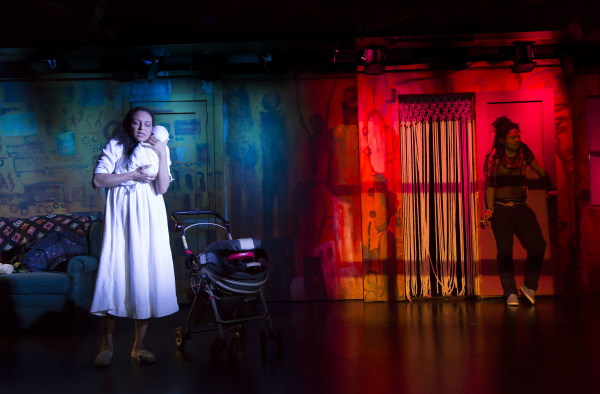Little Children Dream of God

(© Joan Marcus)
Haitian vodou rituals and a trip across the Atlantic Ocean have found their way to Roundabout Underground's Black Box Theatre for the premiere of Jeff Augustin's Little Children Dream of God. Filled with dreamscapes and magical realism, the play stretches the limits of its tiny space. Yet it turns out to be the characters' least expansive activities that make the imaginative production feel the most cramped.
A 25-year-old Haitian woman named Sula (Carra Patterson) floats her way across the Atlantic Ocean in a tire to reach the grungy Promised Land of Miami, where she hopes to make a better life for herself and her unborn son. Eleven months pregnant when she finally arrives, she seeks out an apartment complex, widely known to accept illegal immigrants (an open space, abstractly designed by Andrew Boyce for its many transformations). Patterson embodies the intense determination of a woman who would risk such a perilous journey. With a defensive shriek in her voice, she sternly wears her emotional Kevlar until her tension melts into the security of her new neighbors. Filled with fellow strays, the community is ready to take her in without asking any questions about her sordid history. Still, her past continues to haunt her via gruesome nightmares that place her back at sea. Director Giovanna Sardellia powerfully stages the series of chillingly macabre scenes in collaboration with lighting designer Gina Scherr and sound designer M.L. Dogg.
Carolyn (the building's only nonimmigrant occupant, played by Deirdre O'Connell) is the first resident that we meet. O'Connell exudes a soothing maternal wisdom as this nurse and single mother to eight children of her own who cares for Sula and her baby in her already cramped apartment. Joel (played by Maurice Jones with a winning compassion and somewhat weak spine) has been the building manager since his ailing father handed over the reins. He shares Sula's Haitian heritage, but he has little experience with his native land. Nevertheless, as a kindred spirit (and potential romantic interest), he helps Sula find work as a nanny for his affluent cousin Madison (a charming Crystal Lucas-Perry offering the picture of American assimilation). Meanwhile, a warmhearted male escort, Vishal (given a whimsical, yet grounded performance by Chris Meyers), serves as the building's primary childcare service. The story also extends to a nearby hospital — the latest home for Joel's father and Carolyn's place of business where she verbally spars with a belligerent older patient (a perfectly acerbic Gilbert Cruz).
While the strands joining these characters often feel flimsy and haphazardly intertwined, their strongest bond is the bad omen that seems to have struck Miami since Sula's arrival. Carolyn, who claims to have been in a committed relationship with God since the age of 17, suddenly feels his absence. Joel's father also begins to take a turn for the worse, just as Joel's uncle threatens to take control of the building and close its doors to the illegals it has been harboring for decades. Sula willingly accepts responsibility for God's disappearance, attributing it to her connection to Haitian vodou — a burdensome tether to her past life that she can't seem to cut, even as she sees these lingering spirits harming her own child, who refuses to cry.
The question of which ties to break and which to preserve is an interesting one that Augustin poses — and a relatable one at that, giving the audience something to hold on to as new cultural terms and fantastical images take us into largely uncharted territories. Sula and Joel in particular show the dichotomy of this struggle, as Sula tries to run as far from her past as she can, while Joel, as well as his thoroughly Americanized selfie-snapping cousin, Madison, are drawn to Sula as a symbol of their lost Haitian culture. This sharp examination, however, gets muddled as the play overextends itself with characters, plot lines, and a secondary analysis of the American immigrant experience.
Carolyn, the play's most endearing character and a grounding force for everyone around her, is one that unfortunately falls by the wayside. As she disappears for much of Act 2, she loses her place at the fulcrum of the surrounding action. As her role diminishes, the plot begins to emerge as a love story between Sula and Joel, rather than the empowered woman's intriguing journey of self-discovery that we saw at the top of Act 1. The play's climax — an intensely physical scene performed with wonderful abandon by Patterson — reminds us of this initial trajectory and illustrates the breadth of Augustin's unique theatrical vocabulary. Once he chooses what he wants to say, we will be ready to listen.











